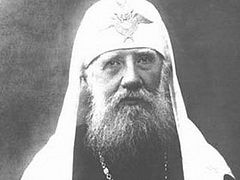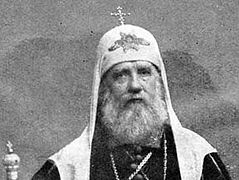July 6–21, 1918, the beautiful city of Yaroslavl on the Upper Volga River suffered mass devastation from the new Bolshevik regime in Russia as the result of an uprising during the civil war in Russia. It was organized by Boris Savinkov’s “Defense of the Motherland and Freedom”, and included White Army officers, students, intelligentsia, townspeople of Yaroslavl, and peasants from surrounding rural areas. Completely outnumbered by the Red Army, hoping for help from the Entente allies that never came, the people fought stubbornly but the uprising was put down brutally. The city lost factories, museums, and many architectural treasures to bombing, and 5000 Yaroslavl citizens were killed. Old Russia was shown that it would not be able to overthrow the new regime by force, and had to resolve itself to its sorrowful fate.
What does one say to a city that has lost everything, including its best sons? The holy Patriarch Tikhon, whose memory we celebrate today, came to grieving Yaroslavl as its former archpastor, now Patriarch, to try to assuage their sorrow.
“What worldly sweetness is free from sorrow?” Even pure, otherworldly spiritual joy is not devoid of this sad tint. So, too, our current joy in our prayerful communion and reunion, after almost five years of separation, is mixed with bitterness at the sight of the devastation that has befallen our city. I feel the same emotions as Jeremiah, who lamented the destruction of Jerusalem:
How doth the city sit solitary, that was full of people! how is she become as a widow! She weepeth sore in the night, and her tears are on her cheeks: among all her lovers she hath none to comfort her... The ways of Zion do mourn, because none come to the solemn feasts: all her gates are desolate: her priests sigh, her virgins are afflicted, and she is in bitterness... Her beauty is departed... All her people sigh, they seek bread; they have given their pleasant things for meat to relieve the soul... They that be slain with the sword are better than they that be slain with hunger: for these pine away... Their skin is black like an oven because of the terrible famine... The children ask bread, and no man breaketh it unto them... We have drunken our water for money; our wood is sold unto us... Behold, O Lord, for I am in distress: my bowels are troubled; mine heart is turned within me; for I have grievously rebelled... (cf. Lamentations 1:2)
It is natural to ask, why has such a catastrophe has struck our city, and who is to blame for it? When the prophet Jeremiah lamented over Jerusalem, it was clear to him that the city had gravely sinned: Jerusalem hath grievously sinned; therefore she is removed (Lamentations 1:8). That is why the Lord did not spare it and allowed its destruction. But let us not rush to condemn the inhabitants of this city. The Lord rebuked the friends of Job, who saw the cause of his suffering in his supposed sinfulness. Let us remember the words of the Lord about the Galileans killed by Pilate, and the eighteen who perished when the tower of Siloam fell: Suppose ye that these Galilaeans were sinners above all the Galilaeans, because they suffered such things? I tell you, Nay: but, except ye repent, ye shall all likewise perish (Luke 13:1–5).
Let us look for the guilty ones—it will not help, and indeed, each of us is guilty to some extent, be it more or less. Let each of us, recognizing our share of guilt, strive to correct and atone for it. Strengthen your arms, feet, and weakened knees. By signing yourselves with the sign of the cross, take up the great task of rebuilding your city, and do not despair at its ruin. Remember, it did not become great and beautiful overnight; it was made so by the long labors of your ancestors and by the blessing of God upon the works of their hands. Be courageous, take up the work of rebuilding, and Let all your things be done with charity (1 Corinthians 16:14).
If human enmity has destroyed the city, then brotherly love can build it even better. This is my fervent wish for you and my prayer to the Lord: But thou hast utterly rejected us; thou art very wroth against us (Lamentations 5:22). Is there still hope? (Lamentations 3:29). It is good that a man should both hope and quietly wait for the salvation of the Lord... For the Lord will not cast off for ever: But though he cause grief, yet will he have compassion according to the multitude of his mercies (Lamentations 3:26, 31–32), and through the prayers of the holy princes of Yaroslavl.
From In the Year of God’s Wrath: Epistles, Homilies, and Speeches (Moscow: St. Tikhon’s Humanitarian University, 2009).





